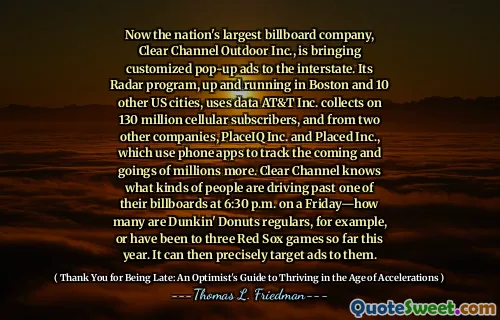
Now the nation's largest billboard company, Clear Channel Outdoor Inc., is bringing customized pop-up ads to the interstate. Its Radar program, up and running in Boston and 10 other US cities, uses data AT&T Inc. collects on 130 million cellular subscribers, and from two other companies, PlaceIQ Inc. and Placed Inc., which use phone apps to track the coming and goings of millions more. Clear Channel knows what kinds of people are driving past one of their billboards at 6:30 p.m. on a Friday—how many are Dunkin' Donuts regulars, for example, or have been to three Red Sox games so far this year. It can then precisely target ads to them.
[The quote highlights the profound shift in advertising approaches driven by technological advancements and data analytics, representing a move from generic billboard ads to highly personalized marketing efforts. This evolution raises significant questions about privacy, ethical use of personal data, and the power imbalances between corporations and individuals. The use of real-time data collected from millions of mobile devices enables targeted advertising that is contextually relevant, increasing its effectiveness. While this might seem like a natural progression of marketing strategies, it also signifies a surveillance economy where personal habits, preferences, and routines are meticulously tracked and analyzed. Such capability enhances consumer experience by providing more relevant content, but it also erodes the boundaries of privacy, potentially leading to misuse or overreach. The implications extend beyond marketing into broader societal issues, including consent, data ownership, and societal control. This technological leap exemplifies how industries leverage big data to influence consumer behavior more precisely than ever before, further blurring the lines between public and private spaces. The ethical considerations surrounding this practice are paramount, prompting ongoing debates on regulation and individual rights in the digital age. Ultimately, this example encapsulates a future where data-driven personalization becomes ubiquitous, prompting us to consider what trade-offs we are willing to accept in exchange for the convenience and efficiency it offers, and how we can safeguard our privacy amid these rapid changes.








